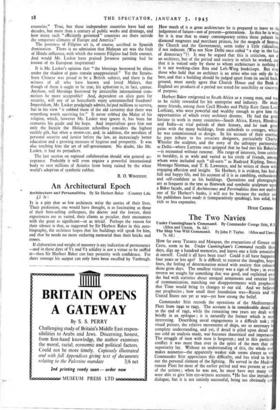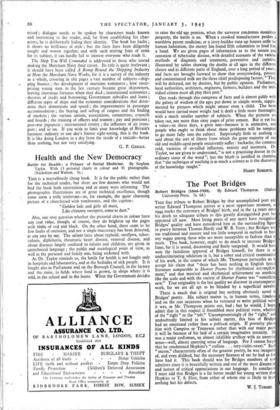The Two Navies
The Ship You Will Command. By John P. Taylor. (Allen and Unwi 7s. 6d.) _
How far away Taranto and Matapan, the evacuations of Greece a Crete, seem to be. Under Cunningham's Command recalls tho days, digs up a hundred memories, and leaves one a little astonish at oneself. Could it all have been true? Could it all have happen four years or less ago? It is difficult to recover the thoughts, hope fears, the feeling of determination mixed with anxiety that colour. those grim days. The smallest victory was a sign of hope ; in eve reverse we sought for something that was good, and explained aw the bad with statistics about unequal armaments and exterior lin of communication, matching our disappointments with propheci that Time would bring its changes to our aid. And we believ our prophecies ; how small their foundation was—Russia and t United States not yet at war—yet how strong the belief.
Commander Stitt records the operations of the Mediterrane Fleet from 194o to 1943. The account is in considerable detail to the end of 1941, while the remaining two years are dealt yei briefly in an epilogue ; it is naturally the former which is m interesting. Describing naval engagements is a difficult task ; visual picture, the relative movements of ships, are so necessary complete understanding, and yet, if detail is piled upon detail a too cold an analysis made, war becomes theoretical and imperson The struggle of men with men is forgotten ; and in this particul conflict it was more than ever in the spirit of the men that a superiority lay. Without an understanding of this, the whole sto makes nonsense—the apparently weaker side seems always to w Commander Stitt appreciates this difficulty, and has tried to bri out the personal element of the fighting. He served in the Mediter ranean Fleet for most of the earlier period and was present at so of the actions ; when he was not, he must have met many w were able to give him eye-witness accounts. °He has also introduc dialogue, but it is not entirely successful, being too obviously co
trived ; dialogue needs to be spoken by characters made known and interesting to the reader, and, far from establishing his char- acters, he is deliberately hiding their identity. The book has faults ; it shows no brilliance of style ; but the facts have been diligently sought and woven together, and with such stirring feats of arms for its subject, it can hardly fail to interest everyone who reads it.
The Ship You Will Command is addressed to those who intend making the Merchant Navy their career. Its title is quite irrelevant ; it should have been called A Romp Round the Shipping Industry or How the Merchant Navy Works, for it is a survey of the industry as a whole, covering in 162 pages a vast number of subjects—ship- ping finance ; the development of maritime commerce ; how enter- prising young men in the last century became great shipowners, leaving enormous fortunes when they died ; international economics ; theories of credit and borrowing, Government subsidies and loans ; different types of ships and the economic considerations that deter- mine their dimensions and speed ; the improvements in passenger accommodation ; the buying and selling of cargoes and the finding of markets ; the various unions, associations, committees, councils 4. and boards ; the training of officers and seamen ; pay and pensions ; post-war prospects ; international rivalry ; the influence of air trans- port ; and so on. If you wish to limit your knowledge of Britain's foremost industry to one day's frantic sight-seeing, this is the book. It is like doing London in a day from the inside of a taxicab—better than nothing, but not very satisfying.
G. P. GRIGGS.



























 Previous page
Previous page